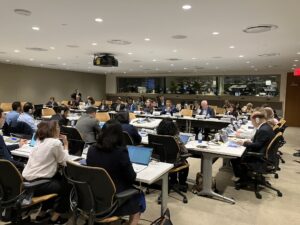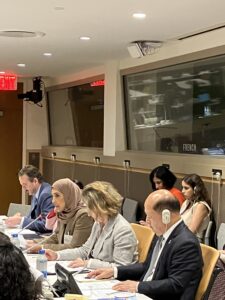On May 24, 2024, a critical event titled “Bridging the Gap: National Human Rights Institutions Protecting and Upholding Older Persons’ Rights” was held at the United Nations Headquarters in New York. Jointly hosted by GANHRI (Global Alliance of National Human Rights Institutions), UNDP, OHCHR, and the permanent missions of Germany, Georgia, and Korea.
The World Health Organization (WHO) projects that by 2030, one-sixth of the global population will be 60 or older, rising to one-fourth by 2050. This demographic shift presents significant social, economic, and political challenges, impacting human rights. The event aimed to address the urgent need for a legally binding convention to protect the rights of older individuals.
~Key Highlights~
Recognition of Demographic Shifts and Challenges Faced by Older Persons
Older individuals often face discrimination based on age, gender, disability, or socioeconomic status, hindering their access to essential services and decision-making. The UN High Commissioner for Human Rights noted that while aging itself isn’t inherently a vulnerability, older persons do encounter specific barriers to realizing their rights.
Role of National Human Rights Institutions (NHRIs)
NHRIs are crucial in promoting and protecting older persons’ rights. They offer advice, address complaints, help governments with legal frameworks, raise awareness through media, and, in some cases, report to parliaments. Partnership between NHRIs, civil society organizations, and UN is vital to connect international human rights norms with domestic implementation.
Advocacy for a Legally Binding Convention
GANHRI submitted a petition paper in May 2024 in Geneva advocating for a legally binding convention on the rights of older persons. The draft convention aims to address gaps in international human rights law and establish protections for older individuals. The representative of the NHRC of Korea introduced its version of the draft.
Showcase of Best Practices and Panel Discussions
The event showcased best practices from NHRIs in Georgia, Australia, Ethiopia, Armenia, Nigeria, Croatia, and Morocco. These initiatives include public support programs (workplace, education, pension, healthcare), awareness campaigns, and measures against abuse and neglect for older persons (most countries define as persons aged 65 and older) and those with disabilities. Collaboration between NHRIs and civil society helps foster universal rights and resolve complaints. 
In conclusion, the event called for stronger multi-stakeholder cooperation through the UN Open-ended Working Group on Ageing and advocated for a comprehensive, legally binding framework to protect and promote the rights of older persons.




